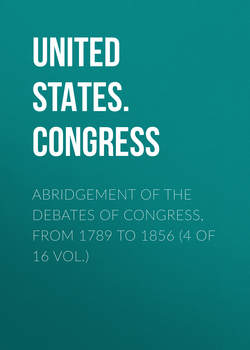Читать книгу Abridgement of the Debates of Congress, from 1789 to 1856 (4 of 16 vol.) - United States. Congress - Страница 12
TENTH CONGRESS. – SECOND SESSION.
BEGUN AT THE CITY OF WASHINGTON, NOVEMBER 7, 1808.
PROCEEDINGS IN THE SENATE
Wednesday, November 30
ОглавлениеThe Embargo
Mr. Pickering. – Mr. President: I am aware, sir, of the consequences of advancing any thing from which conclusions may be drawn adverse to the opinions of our own Administration, which, by many, are conceived to be indisputably just. Merely to state these questions, and to mention such arguments as the British Government may, perhaps, have urged in their support on her side, is sufficient to subject a man to the popular charge of being under British influence, or to the vulgar slander of being a "British tory." He will be fortunate to escape the accusation of touching British gold. But, sir, none of these things move me. The patrons of the miscreants who utter these slanders know better, but are, nevertheless, willing to benefit by the impression they may make on the minds of the people. From an early period of my life I was zealously engaged in every measure opposed to the attempts of Great Britain to encroach upon our rights, until the commencement of our Revolutionary war; and during its whole continuance, I was uninterruptedly employed in important civil or military departments, contributing all my efforts to bring that war to a successful termination.
I, sir, am not the advocate of wrong-doers, to whatever country they belong, whether Emperors, or Kings, or the Administrators of a Republic. Justice is my object, and Truth my guide; and wherever she points the way I shall not fear to go.
Great Britain has done us many wrongs. When we were Colonies, she attempted to deprive us of some of our dearest birth-rights – rights derived from our English ancestors, rights which we defended, and finally established, by the successful conclusion of the Revolutionary war. But these wrongs, and all the wounds of war, were intended to be obliterated and healed by the treaty of peace, when all enmities should have ceased.
Great Britain wronged us in the capture and condemnation of our vessels under her orders of 1793, and she has made reparation for these wrongs, pursuant to a treaty, negotiated on practical principles by a statesman who, with liberal views and real candor, sought adjustment and reparation.
